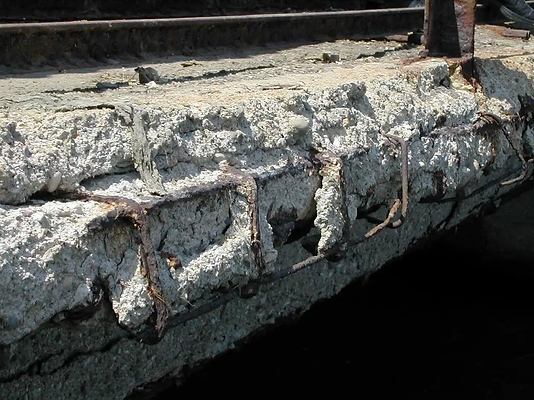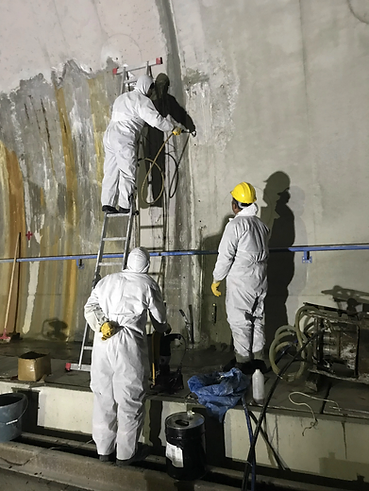FMY CHEMISTRY; It offers high performance coatings and Waterproofing Injection, Crack Injection and Construction Chemicals solutions for areas such as Mines, Dams, Tunnels, Ground Void Filling, Concrete Repairs.
Applications made by various construction chemicals in order to increase the service life by protecting the structures against water and moisture that may come from the outside, and to make the structures waterproof or resistant against leakage, corrosion or abrasion are called “Water Insulation”.
In order to protect the concrete and reinforcements, which are the main load-bearing elements of the buildings (for OneShot Macro Fiber Reinforcement, which is a polypropylene macro fiber fiber that is not affected by corrosion, see also OneShot Macro Fiber), waterproofing applications should be done while the building is still under construction in order to protect it from the harmful effects of water such as corrosion and abrasion. Waterproofing is an application made to protect buildings from external factors, to create a comfortable living space and to protect the elements of the building such as concrete and iron from the negative effects of water.
Water, which comes into contact with the inside of the buildings, corrodes the structural elements such as concrete and iron, resulting in a decrease in cross-sections and load bearing capacity. Into the building components; The water leaking due to reasons such as rain, hail, snow or groundwater on the foundation of the building freezes in cold weather due to seasonal changes and expands and evaporates in hot seasons, causing damage to the structural integrity of the concrete and causing cracks. In addition, water leaking into the concrete in buildings without waterproofing causes mold and rot on the interior and exterior surfaces with the effect of moisture. Thus, it can cause negative and dangerous situations in terms of both building safety and human health.


Building and construction foundations, dams retaining walls, flumes, parking lots, highways, roads, tunnels, sewerage, treatment plants, bridges and viaducts, garbage dumps, floors resting on the ground, balconies, terraces, sloping roofs, wet areas such as bathrooms, washbasins, toilets, drinking water tanks, utility water tanks, structures such as artificial ponds and pools, etc. Waterproofing can be applied in almost all areas where water can enter the buildings, especially the areas.
If the penetration of water into this structure, whose integrity is broken, is not prevented, the penetrating water will cause corrosion in the reinforcement, deformation in the concrete and begin to reduce the load that the skeleton can carry. If the structure, whose bearing strength is reduced, is exposed to seismic movements such as earthquakes, the danger of collapse is inevitable.
During the waterproofing application and waterproofing product selection phase, the most frequently encountered questions of our application team are how to make waterproofing and how to choose a product in waterproofing. First of all, waterproofing depends on many factors related to the conditions of the place where the application will be made.
Leakages in structures such as Tunnels, Bridges, Mines, Dams, Concrete walls, natural stone can be safely sealed and waterproofed, mostly by chemical injection. However, it is important to choose the right injection material and the right application technique to ensure that the structures are waterproof for a long time. Based on our extensive technical and application experience, we help you choose the most suitable injection solution for your project requirements.
There are three main success factors in ensuring the effectiveness and durability/continuity of waterproofing grouting projects. It is essential to choose the injection material, to choose the injection equipment and to choose the injection method in accordance with each other. As FMY Kimya, we offer you all of these factors under one roof:
Choosing the right grouting material and the right grouting product for the project requirements is the first key success factor for a successful insulation. The environment where the waterproofing will be made is analyzed comprehensively, and the waterproofing material is selected according to these criteria, taking into account the properties such as the flexibility of the material, its viscosity and its behavior in contact with water. In short, the choice of waterproofing material is in the first place in affecting the success of the injection process.
The second success factor is the preparation of the selected injection material and the use of appropriate equipment for application. It includes dosing and mixing, application with the right injection pump selection, and the use of the right fittings.
Finally, you can rely on the correct injection method and applications of our company’s expert engineers and application team for perfect and permanent leak closure solutions.
Waterproofing chemicals are used to protect structures against water infiltration. Ready-to-use solutions are sold for sealing the different surfaces of the buildings against moist soil, leakage and infiltrating water. These products can be single-component, double-component or mostly silicate or polyurethane, etc., according to their mixing ratios. is happening. Waterproofing products are often applied under flooring for swimming pools, balconies, bathrooms and kitchens, as well as water tanks, water retention structures, basements and other structures.
The application of waterproofing protects structures against water leaks that can cause expensive and irreversible damage. It is mostly invisible once its application is complete. The drastic fluctuations in humidity levels and temperatures to which a building’s basement or outermost layer of a tunnel can be exposed every day causes the structure to fail. With all kinds of waterproofing engineering services and waterproofing materials, your projects are under guarantee with FMY Kimya quality.
Polyurethane Waterproofing Products
Polyurethane injection system is one of the most effective and precise waterproofing methods, as it perfectly prevents water from coming into contact with concrete, unlike conventional insulation methods. The problem of eliminating water leaks, which is frequently encountered in underground structures, tunnels, elevator shafts, power plant rooms, garages, parking lots, reservoir tanks, can only be eliminated with the Polyurethane injection method. The material close to the fluidity of water is injected into the concrete with a pressurized machine. The material seeps into the cracks and spaces in the concrete where water enters, compresses under pressure and freezes within seconds. After the material is cured, it prevents water penetration into the concrete since it does not deteriorate or dissolve with any external intervention. It saves the concrete and the iron reinforcement inside from the negative effects of water.
Copyright 2023 ©